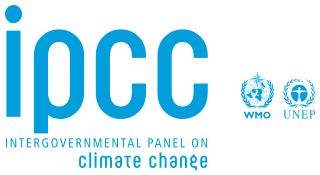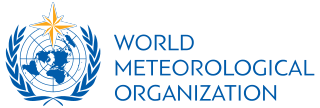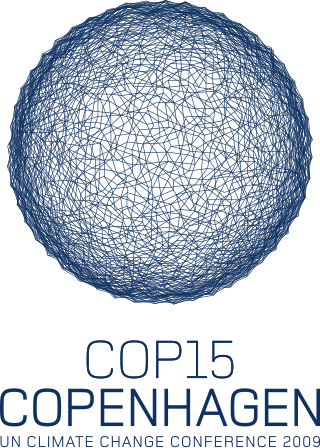Related Research Articles

The Intergovernmental Panel on Climate Change (IPCC) is an intergovernmental body of the United Nations. Its job is to advance scientific knowledge about climate change caused by human activities. The World Meteorological Organization (WMO) and the United Nations Environment Programme (UNEP) established the IPCC in 1988. The United Nations endorsed the creation of the IPCC later that year. It has a secretariat in Geneva, Switzerland, hosted by the WMO. It has 195 member states who govern the IPCC. The member states elect a bureau of scientists to serve through an assessment cycle. A cycle is usually six to seven years. The bureau selects experts to prepare IPCC reports. It draws the experts from nominations by governments and observer organisations. The IPCC has three working groups and a task force, which carry out its scientific work.

The Kyoto Protocol was an international treaty which extended the 1992 United Nations Framework Convention on Climate Change (UNFCCC) that commits state parties to reduce greenhouse gas emissions, based on the scientific consensus that (part one) global warming is occurring and (part two) that human-made CO2 emissions are driving it. The Kyoto Protocol was adopted in Kyoto, Japan, on 11 December 1997 and entered into force on 16 February 2005. There were 192 parties (Canada withdrew from the protocol, effective December 2012) to the Protocol in 2020.
The United Nations Framework Convention on Climate Change (UNFCCC) established an international environmental treaty to combat "dangerous human interference with the climate system", in part by stabilizing greenhouse gas concentrations in the atmosphere. It was signed by 154 states at the United Nations Conference on Environment and Development (UNCED), informally known as the Earth Summit, held in Rio de Janeiro from 3 to 14 June 1992. Its original secretariat was in Geneva but relocated to Bonn in 1996. It entered into force on 21 March 1994.

The World Meteorological Organization (WMO) is a specialized agency of the United Nations responsible for promoting international cooperation on atmospheric science, climatology, hydrology and geophysics.

The World Climate Research Programme (WCRP) is an international programme that helps to coordinate global climate research. The WCRP was established in 1980, under the joint sponsorship of the World Meteorological Organization (WMO) and the International Council for Science (ICSU), and has also been sponsored by the Intergovernmental Oceanographic Commission (IOC) of UNESCO since 1993.
The Intergovernmental Oceanographic Commission of UNESCO (IOC/UNESCO) was established by resolution 2.31 adopted by the General Conference of UNESCO. It first met in Paris at Unesco Headquarters from 19 to 27 October 1961. Initially, 40 States became members of the commission. The IOC assists governments to address their individual and collective ocean and coastal management needs, through the sharing of knowledge, information and technology as well as through the co-ordination of programs and building capacity in ocean and coastal research, observations and services.
The Global Climate Observing System (GCOS) was established in 1992 as an outcome of the Second World Climate Conference, to ensure that the observations and information needed to address climate-related issues are obtained and made available to all potential users. The GCOS is co-sponsored by the World Meteorological Organization (WMO), the Intergovernmental Oceanographic Commission (IOC) of UNESCO, the United Nations Environment Programme (UNEP), and the International Council for Science (ICSU). In order to assess and monitor the adequacy of in-situ observation networks as well as satellite-based observing systems, GCOS regularly reports on the adequacy of the current climate observing system to the United Nations Framework Convention on Climate Change (UNFCCC), and thereby identifies the needs of the current climate observing system.

The First Assessment Report (FAR) of the Intergovernmental Panel on Climate Change (IPCC) was completed in 1990. It served as the basis of the United Nations Framework Convention on Climate Change (UNFCCC). This report had effects not only on the establishment of the United Nations Framework Convention on Climate Change (UNFCCC), but also on the first conference of the parties (COP), held in Berlin in 1995. The executive summary of the WG I Summary for Policymakers report said they are certain that emissions resulting from human activities are substantially increasing the atmospheric concentrations of the greenhouse gases, resulting on average in an additional warming of the Earth's surface. They calculated with confidence that CO2 had been responsible for over half the enhanced greenhouse effect.
After the 2007 United Nations Climate Change Conference held on the island of Bali in Indonesia in December 2007, the participating nations adopted the Bali Road Map as a two-year process working towards finalizing a binding agreement at the 2009 United Nations Climate Change Conference in Copenhagen, Denmark. The conference encompassed meetings of several bodies, including the 13th session of the Conference of the Parties to the United Nations Framework Convention on Climate Change and the third session of the Conference of the Parties serving as the meeting of the Parties to the Kyoto Protocol.

The 2009 United Nations Climate Change Conference, commonly known as the Copenhagen Summit, was held at the Bella Center in Copenhagen, Denmark, between 7 and 18 December. The conference included the 15th session of the Conference of the Parties to the United Nations Framework Convention on Climate Change (UNFCCC) and the 5th session of the Conference of the Parties serving as the meeting of the Parties to the Kyoto Protocol. According to the Bali Road Map, a framework for climate change mitigation beyond 2012 was to be agreed there.

The 2008 United Nations Climate Change Conference took place at PIF Congress Centre, Poznań International Fair (PIF), in Poznań, Poland, between December 1 and December 12, 2008. Representatives from over 180 countries attended along with observers from intergovernmental and nongovernmental organizations.

The 2010 United Nations Climate Change Conference was held in Cancún, Mexico, from 29 November to 10 December 2010. The conference is officially referred to as the 16th session of the Conference of the Parties (COP 16) to the United Nations Framework Convention on Climate Change (UNFCCC) and the 6th session of the Conference of the Parties serving as the meeting of the Parties (CMP 6) to the Kyoto Protocol. In addition, the two permanent subsidiary bodies of the UNFCCC — the Subsidiary Body for Scientific and Technological Advice (SBSTA) and the Subsidiary Body for Implementation (SBI) — held their 33rd sessions. The 2009 United Nations Climate Change Conference extended the mandates of the two temporary subsidiary bodies, the Ad Hoc Working Group on Further Commitments for Annex I Parties under the Kyoto Protocol (AWG-KP) and the Ad Hoc Working Group on Long-term Cooperative Action under the Convention (AWG-LCA), and they met as well.

The 2012 United Nations Climate Change Conference was the 18th yearly session of the Conference of the Parties (COP) to the 1992 United Nations Framework Convention on Climate Change (UNFCCC) and the 8th session of the Meeting of the Parties (CMP) to the 1997 Kyoto Protocol. The conference took place from Monday 26 November to Saturday 8 December 2012, at the Qatar National Convention Centre in Doha.

The United Nations Climate Change Conferences are yearly conferences held in the framework of the United Nations Framework Convention on Climate Change (UNFCCC). They serve as the formal meeting of the UNFCCC parties to assess progress in dealing with climate change, and beginning in the mid-1990s, to negotiate the Kyoto Protocol to establish legally binding obligations for developed countries to reduce their greenhouse gas emissions. Starting in 2005 the conferences have also served as the "Conference of the Parties Serving as the Meeting of Parties to the Kyoto Protocol" (CMP); also parties to the convention that are not parties to the protocol can participate in protocol-related meetings as observers. From 2011 to 2015 the meetings were used to negotiate the Paris Agreement as part of the Durban platform, which created a general path towards climate action. Any final text of a COP must be agreed by consensus.

The 2016 United Nations Climate Change Conference was an international meeting of political leaders and activists to discuss environmental issues. It was held in Marrakech, Morocco, on 7–18 November 2016. The conference incorporated the twenty-second Conference of the Parties (COP22), the twelfth meeting of the parties to the Kyoto Protocol (CMP12), and the first meeting of the parties to the Paris Agreement (CMA1). The purpose of the conference was to discuss and implement plans about combatting climate change and to "[demonstrate] to the world that the implementation of the Paris Agreement is underway". Participants work together to come up with global solutions to climate change.
The history of climate change policy and politics refers to the continuing history of political actions, policies, trends, controversies and activist efforts as they pertain to the issue of global warming and other environmental anomalies. Dryzek, Norgaard, and Schlosberg suggest that critical reflection on the history of climate policy is necessary because it provides 'ways to think about one of the most difficult issues we human beings have brought upon ourselves in our short life on the planet’.

Sustainable Development Goal 13 is about climate action and protecting Life. It is one of 17 Sustainable Development Goals established by the United Nations General Assembly in 2015. The official mission statement of this goal is to "Take urgent action to combat climate change and its impacts". SDG 13 has five targets which are to be achieved by 2030. They cover a wide range of issues surrounding climate action. The first three targets are "output targets": Strengthen resilience and adaptive capacity to climate-related disasters; integrate climate change measures into policies and planning; build knowledge and capacity to meet climate change. The remaining two targets are "means of achieving" targets: To implement the UN Framework Convention on Climate Change, and to promote mechanisms to raise capacity for planning and management. Along with each target, there are “indicators” that provide a method to review the overall progress of each target, along with SDG 13 as a whole. The United Nations Framework Convention on Climate Change (UNFCCC) is the primary international, intergovernmental forum for negotiating the global response to climate change.

The timeline of international climate politics is a list of events significant to the politics of climate change.
Koko Warner is a climate change expert who specializes in human migration and displacement and who holds a PhD in economics from the University of Vienna. In 2014, the International Council for Science named Warner as one of the top 20 women making contributions to climate change debate.
References
- ↑ Shaw, Christopher (2017). "The Two Degrees Celsius Limit". Oxford Research Encyclopedia of Climate Science. doi:10.1093/acrefore/9780190228620.013.15. ISBN 978-0-19-022862-0.